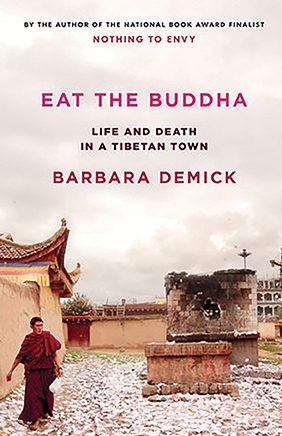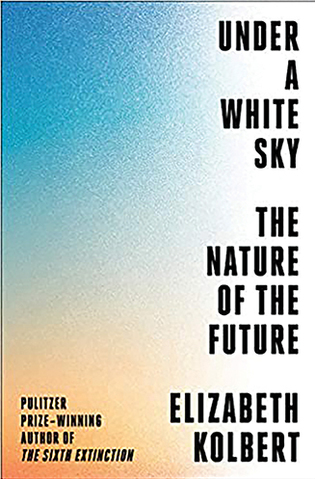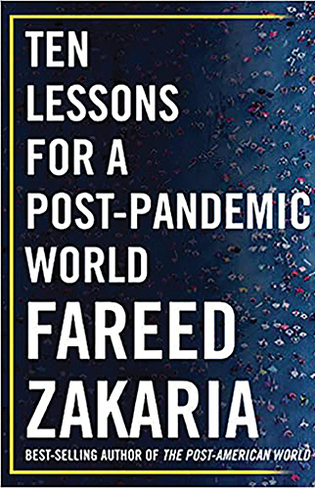
Eat the Buddha: Life and Death in a Tibetan Town
Barbara Demick ’79
Random House, $28
Reviewed by Cathy Shufro
Tibetan teenager Rinzen Dorjee wanted to ensure that he would die when he doused himself with gasoline near a school in the town of Ngaba in Sichuan, China. So before lighting a match, he drank gasoline. As he lay dying in February 2012, the 19-year-old yak herder told his father, “I did it for the sake of all Tibetans and sentient beings.”
Rinzen Dorjee had copied his friend Phuntsog, a monk whose self-immolation in Ngaba a year earlier before had gotten media coverage and catalyzed 25 arrests. Rinzen Dorjee admired Phuntsog for getting noticed by “the Chinese.” Ironically, Rinzen Dorjee and Phuntsog were themselves Chinese citizens; they just didn’t see themselves that way.
Journalist Barbara Demick used Ngaba as her base camp while reporting Eat the Buddha: Life and Death in a Tibetan Town. Her richly detailed and humane book traces the fitful growth of Chinese control in Tibet, starting when the Red Army raided the town in 1935.
Demick follows individuals across decades to show how Chinese influence has both eased and contorted Tibetan lives. She begins with the story of a Ngaba princess, Gonpo, whose father was deposed by Chinese communists and whose mother disappeared. After winning admission to a Beijing high school, Gonpo faced ridicule for her lineage, then endured the Cultural Revolution, digging trenches in Xinjiang. Despite these ordeals, she embraced socialism, forgot her Tibetan language, and married a man from Nanjing. But Gonpo’s family splintered when she visited the Tibetan exile community in Dharamsala, India; she could not risk returning to China.
Others whom Demick follows include a brilliant teacher who manages to circulate the memoir of the 14th Dalai Lama covertly, but later goes to jail for making “Free Tibet” posters. There is Pema, a young bride who repeatedly reinvents herself to survive, and her niece, a TV-loving, Mandarin-speaking teenager who impulsively joins a street protest. She is shot dead.
The stories evoke echoes: of US massacres and forced relocations of Native Americans, of Stalin’s starvation policy in Ukraine, of China’s brutal suppression of Uighurs in Xinjiang, now.
When Rinzen Dorjee died in 2012, he was the 21st Tibetan to self-immolate. Since then, 135 more Tibetans have set themselves on fire.
Cathy Shufro teaches writing at Yale.

Under a White Sky: The Nature of the Future
Elizabeth Kolbert ’83
Crown, $28
Reviewed by Dylan Walsh ’11MEM
Early in her new book, Under a White Sky, Elizabeth Kolbert ’83 visits Plaquemines Parish along Louisiana’s southeastern coast. Plaquemines, one of “the fastest-disappearing places on Earth,” is sinking into the Gulf of Mexico. Kolbert wants to understand how engineers working for the state plan to reverse this process by constructing artificial rivers and overseeing manmade floods. At a public meeting one afternoon an anonymous citizen, after hearing the plan, voices concern. “When we humans intervene, it rarely turns out well,” he says. “That’s why we are where we are today.”
It’s easy to imagine Kolbert nodding along. But her book advances an uncomfortable riposte: Do we have a choice?
Kolbert is a longtime staff writer at the New Yorker, and she has covered climate change (and environmental change more broadly) for decades. This new book is no exception. But rather than reflecting on the changes wrought, she takes our current world as given and looks at what can be done.
She talks to scientists who are struggling to contain invasive Asian carp and to sustain evanescent desert pupfish, who are designing carbon-capture systems and laying blueprints for the vast enterprise of dimming the heat of the sun on earth with stratospheric depositions of calcium carbonate. She talks to groups who are “assisting” the evolution of coral to make it more resistant to the warm, acidic oceans of tomorrow. “Our project,” one scientist explains, “is acknowledging that a future is coming where nature is no longer fully natural.” This is Kolbert’s project too.
In a 2016 interview, Kolbert predicted her future writing: “There’s going to be bad news here, but it’s also going to be interesting.” As it pertains to Under a White Sky, this was understatement on both fronts. The book is thoroughly engrossing even as it knocks you over the head with existentially troubling facts. The storytelling is brisk and infused with Kolbert’s wry asides and observations.
In short, Under a White Sky is a terrorizing pleasure to read. In its grip, we smile and chuckle while marching toward the unknown dark.
Dylan Walsh ’11MEM is a freelance writer based in Chicago. He covers science and criminal justice.

Ten Lessons for a Post-Pandemic World
Fareed Zakaria ’86
W. W. Norton & Company, $26.95
Reviewed by Paul Hofheinz ’84
Fareed Zakaria’s book reads like an appeal to future generations. After a period when passion governed politics and disinformation was the coin of the land, it’s hard to imagine a book with more line-for-line, page-by-page wisdom packed into it. A true tour de force, it showcases the levels of erudition and wit that Zakaria has come to be known for as CNN host and Washington Post columnist. In highly readable prose, the book points out major fault lines that will soon confront voters and world leaders, and gives sound, programmatic advice. It moves effortlessly—sometimes in the same paragraph—through the mechanics of how viruses spread and on to facts about inequality and globalization. The “ten lessons” of the title are themselves well-cast mini-essays on successfully managing the key challenges of postindustrial modernization: improving public health, making government more effective, delivering inclusive growth, restoring multilateralism.
Optimism pervades, but one wonders whom Zakaria is trying to convince. Is he addressing his built-in audience who revere facts and see the post-pandemic era as a chance to right wrongs and restore democracy? Or is he trying to win over the many who dismiss such concerns?
These aren’t idle questions, because one suspects that every reader’s response will depend on where they fall within that spectrum. Everything about this book is intensely rational. That’s its strength, but that’s also its weakness. There’s a lot of sense in Zakaria’s ten lessons. An eleventh could be that high-octane intellectualizing might not be enough to solve the problems by itself. But it’s a good first salvo.
Paul Hofheinz ’84 is president and cofounder of the Lisbon Council, a think tank based in Brussels, Belgium.
 loading
loading

